 Petzlover
Petzlover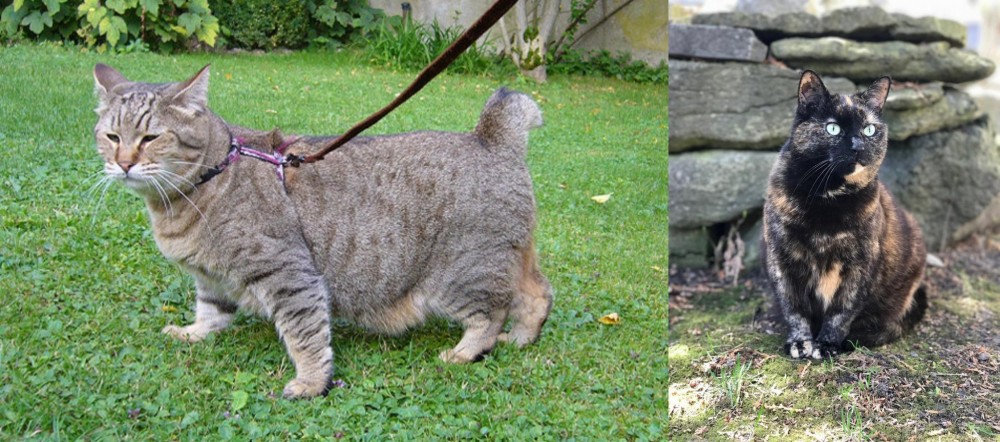 Both Pixie-bob and Tortoiseshell are originated from United States. Both Pixie-bob and Tortoiseshell are having almost same weight. Pixie-bob may live 5 years less than Tortoiseshell. Both Pixie-bob and Tortoiseshell has same litter size. Pixie-bob requires Low Maintenance. But Tortoiseshell requires Moderate Maintenance
Both Pixie-bob and Tortoiseshell are originated from United States. Both Pixie-bob and Tortoiseshell are having almost same weight. Pixie-bob may live 5 years less than Tortoiseshell. Both Pixie-bob and Tortoiseshell has same litter size. Pixie-bob requires Low Maintenance. But Tortoiseshell requires Moderate Maintenance
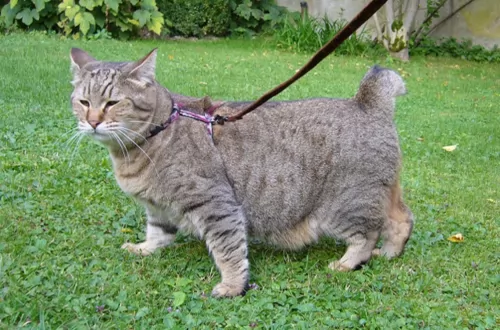 The Pixie-Bob breed is thought to have started from the unplanned litter of a bobcat and a barn cat in 1985. The whole idea of the Pixie-Bob was to get a cat that resembled the North American Bobcat.
The Pixie-Bob breed is thought to have started from the unplanned litter of a bobcat and a barn cat in 1985. The whole idea of the Pixie-Bob was to get a cat that resembled the North American Bobcat.
The barn cat belonged to Carol Ann Brewer, and she named a female kitten Pixie. Pixie became the foundation mother for this breed.
In fact, it was in 1989 that she wrote the first breed standard, naming the breed Pixiebob, in honor of Pixie. In 1998, the Pixiebob achieved TICA championship status. Today, the International Cat Association (TICA) recognizes the Pixie-Bob as a breed.
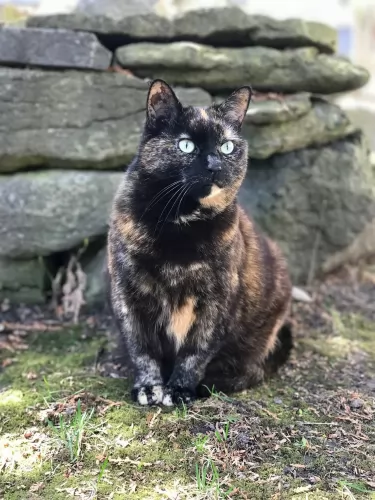 The Tortoiseshell isn’t a cat breed but rather a coat coloring of cats. It just happens that most tortoiseshell cats are females.
The Tortoiseshell isn’t a cat breed but rather a coat coloring of cats. It just happens that most tortoiseshell cats are females.
Known as Torties, these cats always have a couple of colors such as red and black as well as some fawn.
Tortoiseshell cats with the tabby pattern are referred to as Torbie cats. Tortoiseshell markings appear in many different breeds.
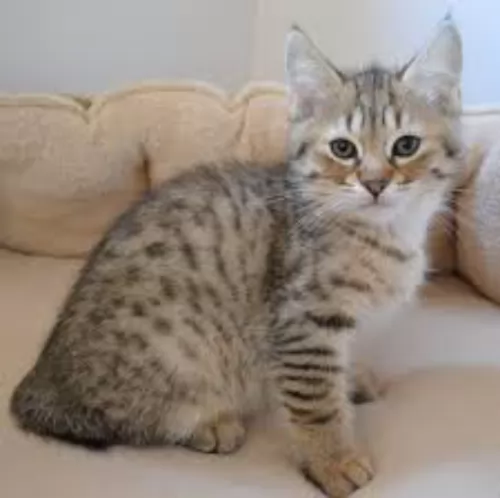 The Pixie-Bob is a medium to large cat that can weigh up to about 8kg. They stand between 25 and 33cm in height.
The Pixie-Bob is a medium to large cat that can weigh up to about 8kg. They stand between 25 and 33cm in height.
It's a muscular cat. These cats have a thick double coat which can be short-haired or long-haired. Most times they have a striped coat pattern with some rosettes. In fact, the pattern on the fur is much like that of a Bobcat.
Their eyes are triangular shaped and they have quite a distinctive heavy brow. The eyes are usually a honey color or they can be green. The tail is rumpy or non-existent or it can be a few inches in length. Sometimes the ears will have some feathering at the tips.
They are polydactyl which means that with their paws, they have more than the regular number of digits.
In spite of there being a wild side to this coat, they are amicable, fairly laid-back type of cats. Pixie-Bobs enjoy being with their owners, loving to quietly spend time with their human beings.
They’re not cats that form a strong bond with just one family member, but they are friendly with everyone in the family. When a stranger calls, they may run off however, to hide in a safe spot.
Some people describe them as dog-like. These cats also have a love for water so don’t be surprised if you see him spending a lot of time playing around his water bowl. This is a cat that just loves being the center of everything that is going on, and yet he has a calm aura about him.
The Pixiebob is talkative, chirping and chattering away as he tells you about what he has got up to during the day.
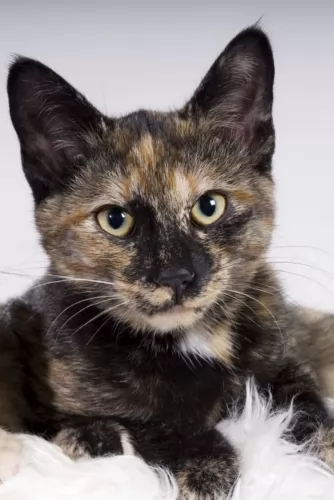 Tortoiseshell cats are your regular-sized cats. They can be medium-sized to large and weigh anything between 3 and 7kg.
Tortoiseshell cats are your regular-sized cats. They can be medium-sized to large and weigh anything between 3 and 7kg.
They come in different colors and patterns. The colors are essentially cream, fawn, black, tan, and orange. Tortoiseshell markings appear in all the different cat breeds.
Because the tortoiseshell cat is a color and not a cat breed as such they can be different sizes and shapes.
Tortoiseshell cats aren't a specific breed, but there are people that believe that just the color of the coat is indicative of the personality – feisty and lively.
People who have owned these cats say they have a sassy temperament and can even be just a wee bit aggressive sometimes with their strong-willed attitude.
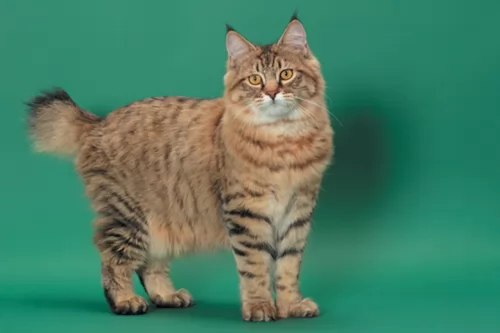 The Pixie-Bob just loves being around his human family and he forms strong bonds with them.
The Pixie-Bob just loves being around his human family and he forms strong bonds with them.
They are social cats and like a dog, they try to become involved in the going-on of the family. By treating this cat well and providing him with a loving home, he is capable of making you a most amicable and energetic member of the family.
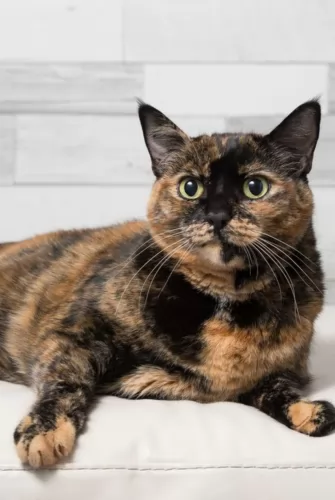 Your Tortoiseshell is a beautiful cat and fondly referred to as a Tortie. It has a coat similar to the coloring of a tortoise, but the temperament of the cat will rely much on your own personality and the lifestyle you provide him with.
Your Tortoiseshell is a beautiful cat and fondly referred to as a Tortie. It has a coat similar to the coloring of a tortoise, but the temperament of the cat will rely much on your own personality and the lifestyle you provide him with.
They are fairly vocal, but because this cat isn't a breed but rather a coat color, nobody can say precisely how it will turn out in personality.
One thing is sure, if you offer your Tortoiseshell lots of love and care, you can be sure of a wonderful feline friend.
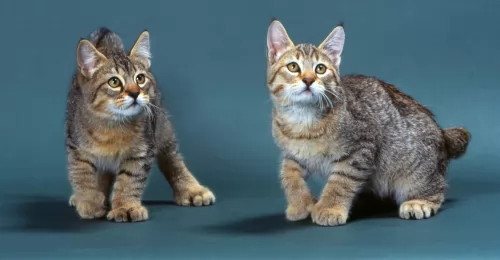 These are healthy cats and they don’t easily get sick. There are always some cat health issues that can crop up with any cat, and with the Pixie Bob, they seem to battle with delivering litters.
These are healthy cats and they don’t easily get sick. There are always some cat health issues that can crop up with any cat, and with the Pixie Bob, they seem to battle with delivering litters.
Sometimes you will hear of Cryptorchidism in these cats which means there is the absence of the testes or scrotum.
Whatever health issues your cat has, always make sure that you get him to the vet for his immunizations as well as for check-ups.
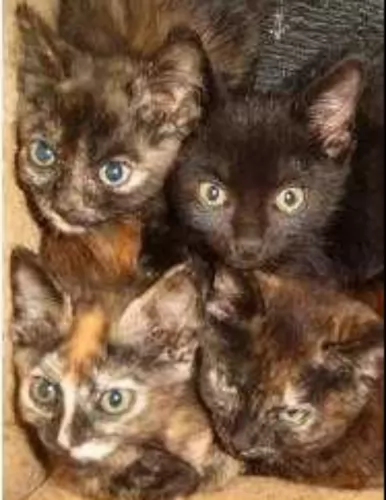 Your cat's health depends on good food. If your finances allow, choose a high-quality food. Check the label for the feeding guidelines.
Your cat's health depends on good food. If your finances allow, choose a high-quality food. Check the label for the feeding guidelines.
Always remember that your cat's age - kittens, adults, and senior cats have different nutritional needs. Sick cats will require a different type of food. Watch your cat's weight because being overweight can bring on a host of illnesses such as diabetes.
A cat has to have access to fresh drinking water every day and night to remain healthy.
Ensuring your feline friend is exercised both mentally and physically is important for good health.
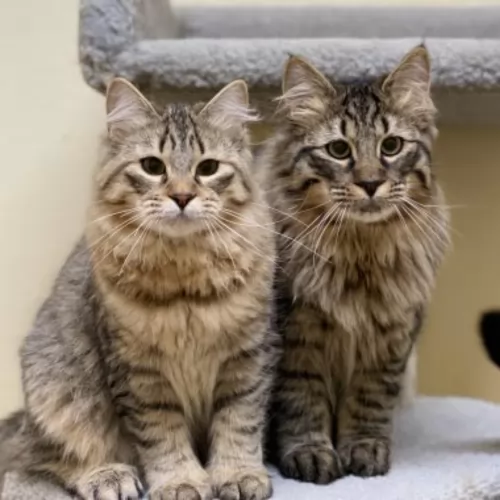 Pixie-bobs don’t require any special diet. When it comes to commercially manufactured cat foods, there are wet foods, dry foods and combination foods. You’ll find out what your cat likes, but remember that a cat is a carnivore and that meat is what they eat.
Pixie-bobs don’t require any special diet. When it comes to commercially manufactured cat foods, there are wet foods, dry foods and combination foods. You’ll find out what your cat likes, but remember that a cat is a carnivore and that meat is what they eat.
Always go for high-quality foods if you are able to because the best foods are better able to keep your cat healthy. The nutritional needs of a cat change as he grows and matures and there are cat foods specially manufactured for every season of your Pixie-Bob’s life.
Always ensure that there is a bowl of clean, fresh, cool water available to your cat.
The short hair of the Pixie-Bob means that it will be easy to give your cat a brush once a week to remove loose hairs.
Always get your cat to the vet when he shows signs of illness. If he comes to you as a kitten he will need his vaccinations as well as worm medicine. Your vet will inform you when to bring you cat in for the next round of vaccinations.
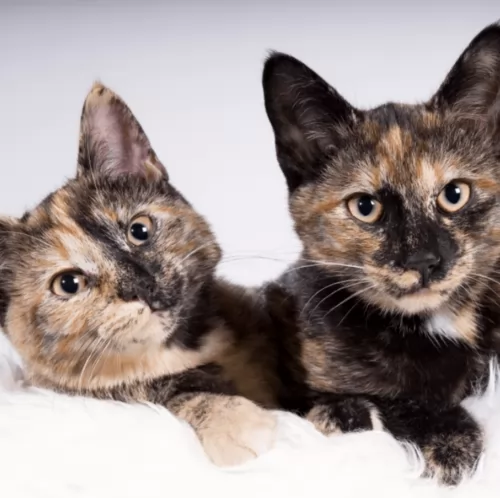 Cats are known to be independent but they still need your care and attention. Before you take a Tortoiseshell into your home, prepare for his arrival.
Cats are known to be independent but they still need your care and attention. Before you take a Tortoiseshell into your home, prepare for his arrival.
Make sure you have food and drinking bowls ready, a comfortable bed, a stylish cat collar and tag of identification, cat accessories such as a brush, toys, and some top-quality cat food.
If you work all day, maybe it would be a good idea to get 2 cats as some cats can get very lonely during the day, and adding a companion can be an excellent solution for his loneliness.
Always be in touch with the vet if you see that your cat isn’t behaving in his usual way.
Your cat will need to be taken for check-ups and also all the necessary cat vaccinations required to ward off deadly cat illnesses.
Provide your cat with a litter box and make sure you remove the cat feces every day.
Provide your cat with toys. Choose them carefully to keep your cat happy and amused. Buy a scratching post too as all cats want to scratch and you want to save your furniture from your cat using it to scratch on.